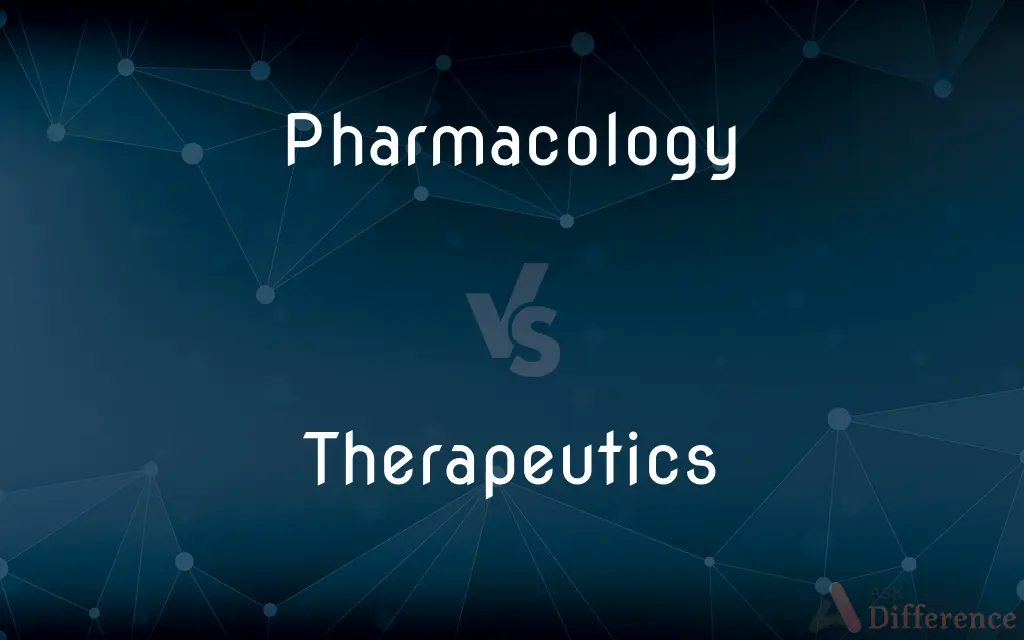Pharmacology vs. Therapeutics — What's the Difference?
By Tayyaba Rehman & Urooj Arif — Updated on March 7, 2024
Pharmacology is the science of drugs and their effects on the body, focusing on understanding drug mechanisms, while therapeutics involves the use of drugs and treatments to heal or manage diseases.

Difference Between Pharmacology and Therapeutics
Table of Contents
ADVERTISEMENT
Key Differences
Pharmacology is a branch of medicine and biology concerned with the study of drug action. It examines how drugs interact with biological systems, aiming to understand the mechanisms by which drugs cause therapeutic and adverse effects. On the other hand, therapeutics is focused on the application of drugs and other forms of treatment to treat and prevent disease. It is more concerned with the practical outcomes of drug use in patients.
In pharmacology, researchers explore the molecular composition of drugs, how drugs are absorbed, distributed, metabolized, and excreted by the body, and their interactions at the organ and cellular levels. Whereas, therapeutics revolves around the principles of drug selection, dosage, efficacy, and safety in the clinical setting. It seeks to optimize drug therapy and management strategies for patient care.
Pharmacologists often work in laboratories, conducting experiments to discover new drugs and understand their effects. This research is critical for developing new therapeutic agents and improving existing ones. Conversely, practitioners of therapeutics, such as physicians and clinicians, apply this knowledge to diagnose, treat, and prevent illness in patients, tailoring treatments to individual needs.
Pharmacology encompasses several subfields, including clinical pharmacology, which bridges the gap between pharmacology and therapeutics. Clinical pharmacologists study the effects of drugs in humans and contribute to the development of therapeutic guidelines. Therapeutics, however, includes not just pharmacotherapy but also other treatment modalities such as surgical, radiological, and physical therapies.
The goal of pharmacology is to provide a comprehensive understanding of drugs, from their molecular mechanisms to their effects on the human body. This knowledge underpins the development of new drugs and therapies. In contrast, the aim of therapeutics is to utilize this knowledge, along with clinical expertise, to achieve the best possible outcomes for patients, prioritizing safety and effectiveness in treatment plans.
ADVERTISEMENT
Comparison Chart
Definition
Science of drugs, including their chemistry, action, and effect on the body.
Use of drugs and other interventions to treat and prevent disease.
Focus
Mechanisms of drug action and interaction with biological systems.
Application of treatments to alleviate or cure diseases.
Key Activities
Drug discovery, understanding drug mechanisms, studying drug effects.
Diagnosing diseases, prescribing drugs, managing patient care.
Practitioners
Pharmacologists, researchers.
Physicians, clinicians, healthcare providers.
Subfields
Clinical pharmacology, toxicology, medicinal chemistry.
Pharmacotherapy, surgical therapy, physical therapy, radiological therapy.
Compare with Definitions
Pharmacology
Study of drugs and their interactions with living organisms.
Pharmacology helps us understand how aspirin reduces pain.
Therapeutics
Application of drugs and treatments to heal diseases.
Therapeutics involves determining the right antibiotic for an infection.
Pharmacology
Focuses on drug composition and properties.
Pharmacology explores why certain drugs cause side effects.
Therapeutics
Focuses on patient care and management.
Therapeutics aims at tailoring treatment plans to individual patient needs.
Pharmacology
Examines the biochemical mechanisms of drugs.
Through pharmacology, we learn how antibiotics kill bacteria.
Therapeutics
Encompasses various treatment methods.
Therapeutics in cancer may include chemotherapy and radiation.
Pharmacology
Involves testing drug safety and efficacy.
Pharmacology ensures that new drugs are safe for human use.
Therapeutics
Integrates multiple disciplines for patient treatment.
Therapeutics combines medication with lifestyle changes for diabetes management.
Pharmacology
Includes the development of new pharmaceuticals.
Pharmacology research leads to the discovery of new cancer treatments.
Therapeutics
Utilizes clinical trials to inform treatment.
Therapeutics relies on clinical trial data to choose the best drug regimens.
Pharmacology
Pharmacology is a branch of medicine, biology and pharmaceutical sciences concerned with drug or medication action, where a drug may be defined as any artificial, natural, or endogenous (from within the body) molecule which exerts a biochemical or physiological effect on the cell, tissue, organ, or organism (sometimes the word pharmacon is used as a term to encompass these endogenous and exogenous bioactive species). More specifically, it is the study of the interactions that occur between a living organism and chemicals that affect normal or abnormal biochemical function.
Therapeutics
Medical treatment of disease; the art or science of healing.
Pharmacology
The science of drugs, including their composition, uses, and effects.
Therapeutics
(medicine) The treatment of disease; the science of healing; any therapeutic material or treatment
Pharmacology
The characteristics or properties of a drug, especially those that make it medically effective.
Therapeutics
That part of medical science which treats of the discovery and application of remedies for diseases.
Pharmacology
(medicine) The science of drugs including their origin, composition, pharmacokinetics, therapeutic use, and toxicology.
Therapeutics
Branch of medicine concerned with the treatment of disease
Pharmacology
(medicine) The properties and reactions of drugs especially with relation to their therapeutic value.
Pharmacology
Knowledge of drugs or medicines; the art of preparing medicines.
Pharmacology
A treatise on the art of preparing medicines.
Pharmacology
The science or study of drugs: their preparation and properties and uses and effects
Common Curiosities
How does therapeutics differ from pharmacology?
Therapeutics focuses on the application of drugs and treatments to cure or manage diseases, while pharmacology is concerned with understanding how these drugs work at a molecular and systemic level.
Can a pharmacologist work in therapeutics?
Yes, especially in roles like clinical pharmacology, where there's a direct bridge between drug research and patient care.
What role do pharmacologists play in drug development?
Pharmacologists conduct research to discover new drug targets, understand drug actions, and develop new therapeutic agents.
Are there ethical considerations in pharmacology and therapeutics?
Yes, both fields are governed by ethical guidelines to ensure that drug development and treatment are conducted responsibly and with patient safety as a priority.
How do healthcare providers use therapeutics?
They use therapeutics to diagnose, treat, and prevent illnesses, relying on their understanding of pharmacology to select appropriate treatments.
What is the relationship between pharmacology and pharmacy?
Pharmacology provides the scientific basis for pharmacy, which focuses on the preparation, dispensing, and proper use of medications.
What is pharmacology?
Pharmacology is the scientific study of drugs, including their effects, mechanisms of action, and role in treating diseases.
How do clinical trials fit into therapeutics?
Clinical trials are crucial for testing the efficacy and safety of therapeutic strategies, informing best practices in patient care.
Why is pharmacology important to medicine?
It provides the foundational knowledge necessary for developing new drugs and understanding their safe and effective use in treating diseases.
How does pharmacology impact public health?
It plays a key role in developing vaccines, antibiotics, and other treatments that are foundational to public health.
What advancements have been made in pharmacology recently?
Recent advancements include the development of targeted therapies and biologics that offer new treatment options for various diseases.
What challenges face pharmacology today?
Challenges include drug resistance, side effects, and the need for more effective treatments for complex diseases.
What is the goal of therapeutics?
The primary goal is to use medical knowledge and interventions to treat patients and improve their quality of life.
How is personalized medicine related to therapeutics?
Personalized medicine, an approach within therapeutics, tailors treatment to individual patient characteristics, optimizing outcomes.
Can therapeutics include non-drug treatments?
Yes, it encompasses all forms of treatments, including surgery, radiation, and lifestyle modifications, in addition to pharmacotherapy.
Share Your Discovery

Previous Comparison
Blue vs. Indigo
Next Comparison
County vs. ProvinceAuthor Spotlight
Written by
Tayyaba RehmanTayyaba Rehman is a distinguished writer, currently serving as a primary contributor to askdifference.com. As a researcher in semantics and etymology, Tayyaba's passion for the complexity of languages and their distinctions has found a perfect home on the platform. Tayyaba delves into the intricacies of language, distinguishing between commonly confused words and phrases, thereby providing clarity for readers worldwide.
Co-written by
Urooj ArifUrooj is a skilled content writer at Ask Difference, known for her exceptional ability to simplify complex topics into engaging and informative content. With a passion for research and a flair for clear, concise writing, she consistently delivers articles that resonate with our diverse audience.
















































